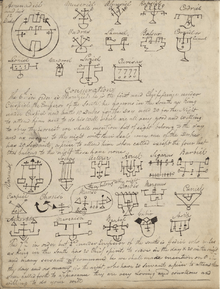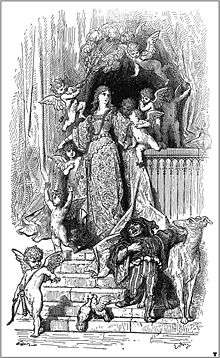Incantation

An incantation, enchantment, magic spell, or magic charm is a set of words, spoken or unspoken, which are considered by its user to invoke some magical effect. An incantation may take place during a ritual, either a hymn or prayer, and may invoke or praise a deity. In magic, occultism, shamanism, and witchcraft it is used with the intention of casting a spell on an object or a person. The term derives from Latin "incantare" (tr.), meaning "to chant (a magical spell) upon," from in- "into, upon" and cantare "to sing".
In medieval literature, folklore, fairy tales and modern fantasy fiction, enchantments (from the Old French "enchantement") are charms or spells. The term was loaned into English since around AD 1300. The corresponding native English term being "galdr" "song, spell". It has led to the terms "enchanter" and "enchantress", for those who use enchantments.
The weakened sense "delight" (compare the same development of "charm") is modern, first attested in 1593 (OED).
Surviving written records of historical magic spells were largely obliterated in many cultures by the success of the major monotheistic religions, Hinduism, Islam, Judaism, and Christianity, which label some magical activity as immoral or associated with evil.[1]
In folklore and fiction

In traditional fairy tales or fantasy fiction, an enchantment is a magical spell that is attached, on a relatively permanent basis, to a specific person, object or location, and alters its qualities, generally in a positive way. A widely known example is the spell that Cinderella's Fairy Godmother uses to turn a pumpkin into a coach. An enchantment with negative characteristics is usually instead referred to as a curse.
Conversely, enchantments are also used to describe spells that cause no real effects but deceive people, either by directly affecting their thoughts or using some kind of illusions. Enchantresses are frequently depicted as able to seduce by such magic. Other forms include deceiving people into believing that they have suffered a magical transformation.
Effects
.jpg)
To be enchanted is to be under the influence of an enchantment, usually thought to be caused by charms or spells.
The Latin incantare, which means 'to utter an incantation', or cast a magic spell, forms the basis of the word "enchant", with deep linguistic roots going back to the Proto-Indo-European kan- prefix. So it can be said that an enchanter or enchantress casts magic spells, or utters incantations, similar to what are called Mantra in Sanskrit.
Magic words
.jpg)
Magic words or words of power are words which have a specific, and sometimes unintended, effect. They are often nonsense phrases used in fantasy fiction or by stage prestidigitators. Frequently such words are presented as being part of a divine, adamic, or other secret or empowered language. Certain comic book heroes use magic words to activate their powers.
Examples of traditional magic words include Abracadabra, Hocus pocus, Open sesame, and Sim Sala Bim.
Craig Conley, a scholar of magic, writes that the magic words used by conjurers may originate from "pseudo-Latin phrases, nonsense syllables, or esoteric terms from religious antiquity," but that what they have in common is "language as an instrument of creation."[2]
Some collections of charms
- The Old English Metrical Charms
- The Carmina Gadelica, a collection of Gaelic oral poetry, much of it charms
- The Atharva Veda, a collection of charms, and the Rigveda, a collection of hymns or incantations
- Hittite ritual texts
- The Greek Magical Papyri
- Mandaean style incantations
- The Merseburg Incantations
- Cyprianus
- Pow-Wows; or, Long Lost Friend
- You can listen to a Babylonian incantation being read aloud by a modern scholar.[3] (It is possible to view a translation and transcription while listening).
- Mesopotamian incantations were composed to counter anything from witchcraft (Maqlû) to field pests (Zu-buru-dabbeda).
Modern uses and interpretations
The performance of magic almost always involves the use of language. Whether spoken out loud or unspoken, words are frequently used to access or guide magical power. In The Magical Power of Words (1968), S. J. Tambiah argues that the connection between language and magic is due to a belief in the inherent ability of words to influence the universe. Bronisław Malinowski, in Coral Gardens and their Magic (1935), suggests that this belief is an extension of man's basic use of language to describe his surroundings, in which "the knowledge of the right words, appropriate phrases and the more highly developed forms of speech, gives man a power over and above his own limited field of personal action."[4]:235 Magical speech is therefore a ritual act and is of equal or even greater importance to the performance of magic than non-verbal acts.[5]:175–176
Not all speech is considered magical. Only certain words and phrases or words spoken in a specific context are considered to have magical power.[5]:176 Magical language, according to C. K. Ogden and I. A. Richards's (1923) categories of speech, is distinct from scientific language because it is emotive and it converts words into symbols for emotions; whereas in scientific language words are tied to specific meanings and refer to an objective external reality.[5]:188 Magical language is therefore particularly adept at constructing metaphors that establish symbols and link magical rituals to the world.[5]:189
Malinowski argues that "the language of magic is sacred, set and used for an entirely different purpose to that of ordinary life."[4]:213 The two forms of language are differentiated through word choice, grammar, style, or by the use of specific phrases or forms: prayers, spells, songs, blessings, or chants, for example. Sacred modes of language often employ archaic words and forms in an attempt to invoke the purity or "truth" of a religious or a cultural "golden age". The use of Hebrew in Judaism is an example.[5]:182
Another potential source of the power of words is their secrecy and exclusivity. Much sacred language is differentiated enough from common language that it is incomprehensible to the majority of the population and it can only be used and interpreted by specialized practitioners (magicians, priests, shamans, even mullahs).[4]:228[5]:178 In this respect, Tambiah argues that magical languages violate the primary function of language: communication.[5]:179 Yet adherents of magic are still able to use and to value the magical function of words by believing in the inherent power of the words themselves and in the meaning that they must provide for those who do understand them. This leads Tambiah to conclude that "the remarkable disjunction between sacred and profane language which exists as a general fact is not necessarily linked to the need to embody sacred words in an exclusive language."[5]:182
See also
- Carmen (verse), the term for an Ancient Roman incantation
- Kotodama
- Lorica (incantation)
- Mantra
- Prayer
- Shamanism
- Yajna
- Zagavory
References
| Wikimedia Commons has media related to Witchcraft. |
- ↑ Davies, Owen (8 April 2009). "The top 10 grimoires". The Guardian. Retrieved 24 October 2017.
- ↑ Conley, Craig (2006). Magic Words: A Dictionary (revised second edition). In-Spired.
- ↑ "The Recordings: BAPLAR: SOAS". speechisfire.com.
- 1 2 3 Malinowski, Bronislaw (2013). Coral Gardens and Their Magic: A Study of the Methods of Tilling the Soil and of Agricultural Rites in the Trobriand Islands. Hoboken, New Jersey: Taylor & Francis. ISBN 1136417737.
- 1 2 3 4 5 6 7 8 Tambiah, S. J. (June 1968). "The Magical Power of Words". Man. 3 (2). doi:10.2307/2798500. JSTOR 2798500.
- Bibliography